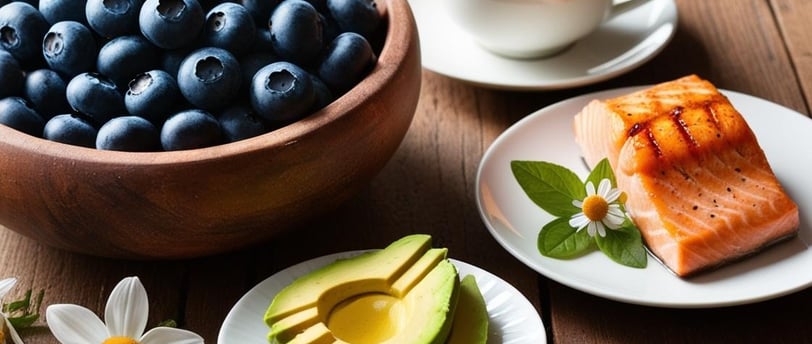Foods That Help Combat Stress and Anxiety
12/3/20243 min read


Stress and anxiety are common challenges in today’s fast-paced world. While lifestyle changes and relaxation techniques play vital roles in managing these conditions, your diet can also significantly impact how you feel. Certain foods contain nutrients that naturally reduce stress, promote relaxation, and boost overall mental well-being. Here’s a guide to the best foods to include in your diet to help combat stress and anxiety.
1. Dark Chocolate
Dark chocolate isn’t just a delicious treat—it’s a mood booster too.
Why It Works: Rich in magnesium, dark chocolate helps relax muscles and calm the nervous system. It also promotes the release of serotonin, a neurotransmitter that improves mood.
How to Enjoy: Opt for dark chocolate with at least 70% cocoa content. Enjoy a small square as an afternoon snack or dessert.
2. Fatty Fish
Fatty fish like salmon, mackerel, and sardines are rich in omega-3 fatty acids, which are essential for brain health.
Why It Works: Omega-3s reduce inflammation and regulate cortisol, the body’s primary stress hormone. They also improve serotonin levels.
How to Enjoy: Include fatty fish in your diet twice a week. Grilled salmon or a tuna salad are easy and nutritious options.
3. Nuts and Seeds
Nuts and seeds are nutritional powerhouses packed with stress-relieving nutrients.
Why It Works: Almonds, walnuts, and sunflower seeds are high in magnesium and B vitamins, which play a critical role in managing stress.
How to Enjoy: Snack on a handful of mixed nuts or sprinkle seeds over your salad or yogurt.
4. Leafy Green Vegetables
Leafy greens like spinach, kale, and Swiss chard are full of nutrients that support mental health.
Why It Works: Magnesium in leafy greens helps regulate the nervous system, while folate boosts the production of dopamine, the feel-good neurotransmitter.
How to Enjoy: Incorporate leafy greens into smoothies, soups, or stir-fries.
5. Berries
Berries such as blueberries, strawberries, and raspberries are loaded with antioxidants and vitamins.
Why It Works: Antioxidants combat oxidative stress, a contributor to anxiety. Vitamin C in berries also helps lower cortisol levels.
How to Enjoy: Add a handful of berries to your morning oatmeal, yogurt, or snack on them throughout the day.
6. Whole Grains
Whole grains like oatmeal, quinoa, and brown rice provide a steady source of energy and nutrients.
Why It Works: Complex carbohydrates in whole grains increase serotonin production, promoting relaxation and reducing anxiety.
How to Enjoy: Swap refined grains for whole grain alternatives in your meals. Oatmeal topped with fruit is a great breakfast choice.
7. Herbal Teas
Certain herbal teas have natural calming properties.
Why It Works: Chamomile and peppermint teas are known to relax the body and mind, while green tea contains L-theanine, an amino acid that reduces stress.
How to Enjoy: Brew a warm cup of your favorite herbal tea in the evening to unwind.
8. Fermented Foods
Foods like yogurt, kefir, sauerkraut, and kimchi are rich in probiotics, which benefit gut health.
Why It Works: A healthy gut microbiome is linked to lower levels of anxiety and improved mood.
How to Enjoy: Include a serving of fermented foods in your diet daily. Add yogurt to smoothies or serve kimchi as a side dish.
9. Avocados
Avocados are packed with healthy fats and essential nutrients.
Why It Works: High levels of B vitamins in avocados help reduce stress and promote brain health. Potassium also lowers blood pressure, helping you stay calm.
How to Enjoy: Spread avocado on toast, blend it into a smoothie, or add slices to salads.
10. Turmeric
Turmeric is a bright yellow spice with powerful anti-inflammatory properties.
Why It Works: Curcumin, the active ingredient in turmeric, enhances brain function and reduces symptoms of anxiety.
How to Enjoy: Add turmeric to soups, curries, or mix it into warm milk for a golden latte.
Foods to Limit for Better Mental Health
While incorporating these nutritious foods, it’s also essential to avoid or limit foods that can exacerbate stress and anxiety:
Caffeine: Excessive caffeine can increase heart rate and anxiety levels.
Refined Sugars: High-sugar foods can cause energy spikes and crashes.
Processed Foods: Foods high in trans fats and additives can negatively impact brain health.
Building a Stress-Relieving Diet
Creating a diet that supports your mental health doesn’t have to be complicated. Here’s how to get started:
Plan Ahead: Meal prep nutritious options to avoid reaching for unhealthy snacks during stressful moments.
Stay Hydrated: Drink plenty of water throughout the day to support overall health.
Balance Your Plate: Include a mix of protein, healthy fats, and complex carbohydrates in each meal.
Conclusion: Nourish Your Body, Calm Your Mind
The foods you eat play a vital role in managing stress and anxiety. By making mindful choices and incorporating these stress-relieving foods into your diet, you can support both your physical and mental well-being. Remember, small changes in your eating habits can lead to significant improvements in how you feel every day.
